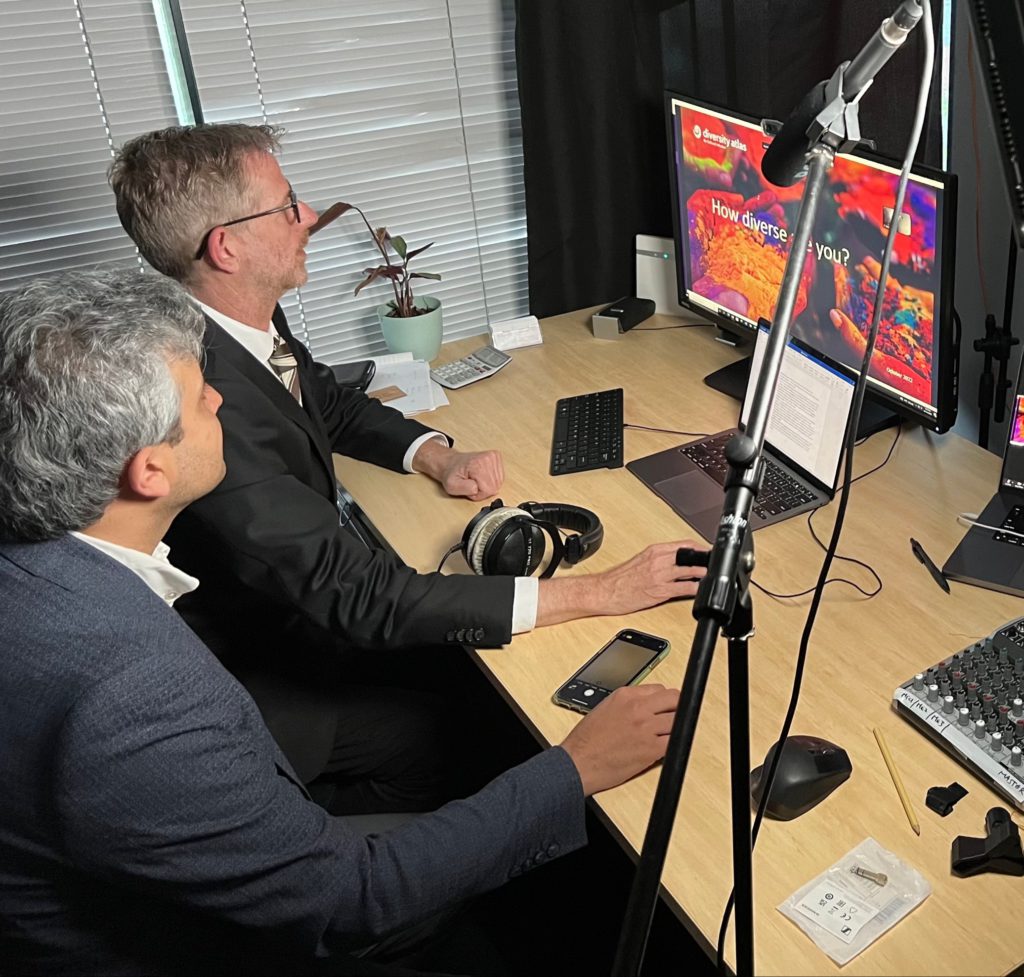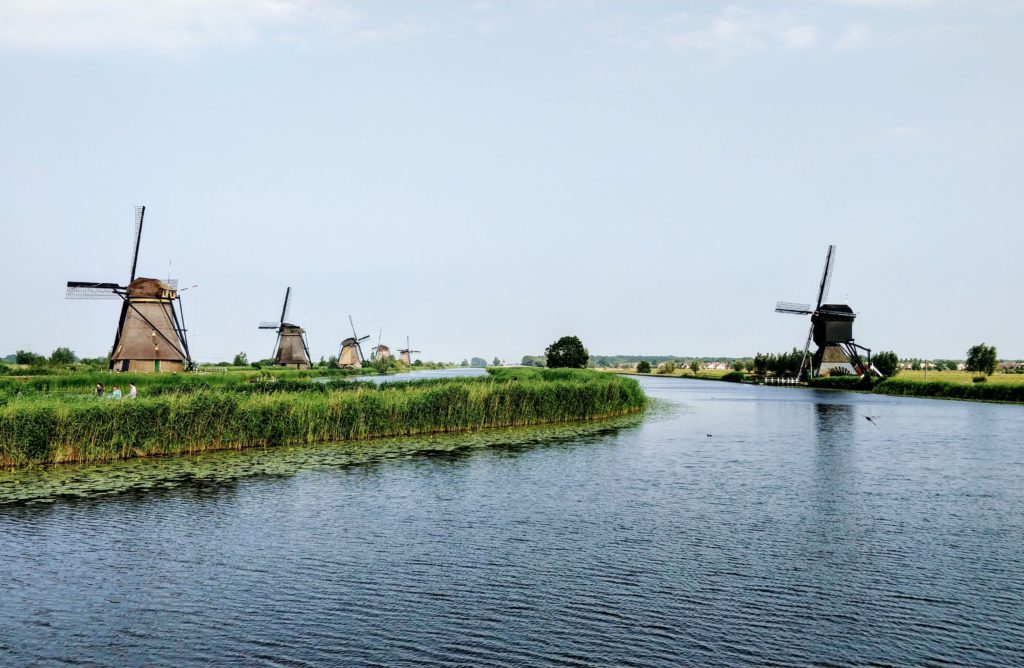![Featured image for “Diversity Atlas Newsletter [September 2022]”](https://diversityatlas.io/wp-content/uploads/2022/10/rhthjart.png)
Data and Diversity in Discussions Around the World
This newsletter, we discuss the upcoming travels of our Chief Experience Officer Michael Walmsley and Chief Technology Officer Rezza Moieni to Singapore for Big Data & AI World’s Tech Week. We also share our Founder and CEO Peter Mousaferiadis’ recent trip to New York, where he attended the United Nation’s General Assembly Week and the UN Global Compact’s Private Sector Forum. Our CTO Rezza Moieni and Cultural Attaché Quincy Hall conducted a tour of the Diversity Atlas surveying platform on a webinar hosted by Diversity Council Australia. To help guide our program development, we ask for your participation in a quick Diversity, Equity and Inclusion training survey. To conclude, we feature an upcoming date from our Diversity Calendar.

Tech Week Singapore
Diversity Atlas’s Chief Experience Officer Michael Walmsley and Chief Technology Officer Rezza Moieni are travelling to Singapore for Tech Week, hosted by Big Data & AI World.
Tech Week Singapore is one of Asia’s largest and most prestigious big data, analytics and artificial intelligence events. The award-winning event connects tech strategy leaders from across the world to discuss innovations in data and AI technology.
Diversity Atlas is hosting a booth at the event, where we hope to contribute to conversations around data-driven decisions and strategies to enhance business performances and impacts.
“We are pleased that Diversity Atlas is being nominated to represent Victorian organisations that deliver innovation to new audiences around the world. We are honoured to assist organisations in understanding the role of data in realising the value of diverse workforces.”
Michael Walmsley, Chief Experience Officer for Cultural Infusion
To find out more, visit this link

DEI Training Survey
Have your say by taking part in our 30-second survey on Diversity, Equity and Inclusion (DEI) training needs!
Diversity Atlas is teaming up with universities and colleges to deliver world-class DEI education and training programs. We encourage you to participate in a short 30-second survey to assess education and training needs.
This global research will guide our program development and delivery priorities, as they play a key role in workplace transformation.
In return for your valuable feedback, the survey offers you the option to receive the results of the survey, a copy of our latest thought leadership piece, “Transforming Diversity, Equity and Inclusion”, and details of our DEI training offerings as they arise.
To participate in the survey, click here.

Diversity Atlas Platform Tour, Hosted by DCA
Our CTO Rezza Moieni and Cultural Attaché Quincy Hall provided a tour through the Diversity Atlas platform, with an introduction from Diversity Council Australia (DCA)’s Dr Jane O’Leary.
Rezza and Quincy demonstrated Diversity Atlas’s cultural diversity measuring and mapping platform on a 30-minute webinar hosted by DCA. The tour explored the survey, dashboard and the methodology of measuring and mapping diversity across a given cohort.
The webinar explained how the Diversity Atlas platform works alongside DCA’s Counting Cultures framework and explored case studies from other organisations, including Amazon and the UN, who have implemented Diversity Atlas across their organisation.
Quincy Hall and I presented Diversity Atlas exclusively for a wonderful group of 120+ Diversity Council Australia Ltd members. Thank you Jane O’Leary, Rose D’Almada-Remedios and all our wonderful friends there. I love the work we are doing together and am learning from our conversations all the time.
Rezza Moieni, Chief Technology Officer, 2022
Diversity Atlas features the world’s largest commercially available datasets of people-groups, languages and worldviews. To find out more, visit our website.

UN General Assembly Week and the UN Global Compact’s Private Sector Forum
This month, our Founder and CEO Peter Mousaferiadis travelled to New York to participate in the UN’s General Assembly Week and the UN Global Compact’s Private Sector Forum.
The 77th session of the UN General Assembly week responded to the health, energy, humanitarian and economic crises exacerbated by the Covid-19 pandemic. The 2022 UN Private Sector Forum comprised chief executives from UN Global Compact organisations and government representatives.Peter participated in the event and met with global representatives to discuss and support ideas for urgent and collective action aligned with the UN’s 17 Sustainable Development Goals (SDGs).
This year, the theme was ‘A watershed moment: transformative solutions to interlocking challenges‘, with a focus on global sustainability. Today, companies and public organisations increasingly benefit from upholding the values of the SDGs.
Diversity Atlas enables organisations to gain fuller understanding of their diversity. Using technology, cultural anthropology and organisational theory, our online data-driven platform assists in developing strategies towards greater representation, equity and inclusion.
New Features & Updates

Diversity Calendar Spotlight
For this month’s highlight on our Diversity Calendar, we’re putting the spotlight on one of the United Nations’ days of awareness – the 17th of October, in this case, is the International Day for Eradication of Poverty.
The theme for this year is ‘Building Forward Together: Ending Persistent Poverty, Respecting all People and Our Planet’. Established by the UN in 1987, the International Day for the Eradication of Poverty promotes understanding towards people living in poverty and raises awareness of the importance of eradicating poverty.
This day tackles issues of poverty including dangerous work conditions, unsafe housing, lack of nutritious food, unequal access to justice, lack of political power and limited access to health care. The United Nations acknowledges that persons living in poverty experience many interrelated deprivations that prevent them from exercising basic human rights.
To discover more upcoming cultural events, visit our Diversity Calendar.

In this product update, Diversity Atlas’ Cultural Attaché, Quincy Hall, introduces the two new Worldviews added to the survey platform.
Two New Religions – Sort Of
We already have 7900 options of religion/worldview in our Diversity Atlas survey, including more than 100 Catholic denominations and branches and a whole heap of secularist choices such as Humanism, Secularism and more recent movements such as Jedi, Dudeism and Pastafarianism. But such is the depth of humanity’s ability to wonder and subscribe, it’s not enough. We’ll always be adding, and we added two this month.
One came about as a result of reading anonymous feedback from our participants, some of which expressed that the plethora of Christian options we provide (eg: Christian – Orthodox – Russian Orthodox, or Christian – Protestant – Uniting Church) felt too much like pigeon-holing. Whilst we do offer the choice to just select ‘Christianity’, even that, some participants pointed out, felt like it was possibly aligning itself to (and in a way, authenticating or enabling) mainstream Christian churches. The ‘fix’ to this was inspired by high selections of another worldview, namely, ‘Spiritual – Self Defined’. Using that popular selection as a cue, we have added ‘Christianity – Self Defined’ to offer people the chance to express their Christianity without having to feel constrained by or limited to any organised branch of Christianity. It remains to be seen if the selection will be popular, but we will keep a close eye on this in the coming months. And who knows, maybe ‘Buddhism – Self Defined’ (among others) may be on the cards soon as well.
Our second new entry again came from participant feedback. We were contacted by a customer who passed on a message from one of their staff that we did not include IETSISM, and, after some quick research by our database team and some liaison with our religious scholars and advisors, we have added it in. Translated into English, IETSISM means SOMETHING-ISM and can broadly be described as a worldview that posits that although an individual may reject the notion that God, Gods or Supreme Beings (sentient or not) exist in the manner by which mainstream religion/s and/or spiritual movements may express, define or believe to be true, they do believe that there is something out there; a higher power of some sort. It’s a kind of ‘spiritual but not religious’ worldview, but with what we think is an awesome name – Ietsism – named so as the movement was born in the Netherlands and ‘iets’ is the Dutch word for ‘something’.
Here’s a line from the Wikipedia entry on Ietsism that stood out:
“As ietsists cannot be neatly classified as religious or nonreligious, ietsism is somewhat notorious for blighting statistics on religious demographics. Hence labeling ietsists as either religious or nonreligious will tilt the demographic balance for those countries to either predominantly religious or predominantly nonreligious.”
In our Diversity Atlas, this ‘blighting of statistics’ is not a ‘thing’. Sorting the data by theism, agnosticism, atheism and so on is just one method by which we can analyse results to paint a picture of a cohort’s identity, but, we have plenty of others as well (eg: ‘Abrahamic’, ‘Confucianist’ and so on). What matters to us is the counting, the hi-res data that allows people to pick more than one ‘worldview’ to express their identity without ever feeling limited to one-thing, and allowing our customers to see proper results in a variety of aggregated and de-aggregated ways. People are complex (thankfully), and as data-gatherers, we need to make space for people to, as best as we can, identify / select their singular or multiple worldviews (or absence thereof), even if it’s as vague, broad and beautiful as believing that there’s something up there that they do not need or even perhaps want to define.
Share this Post